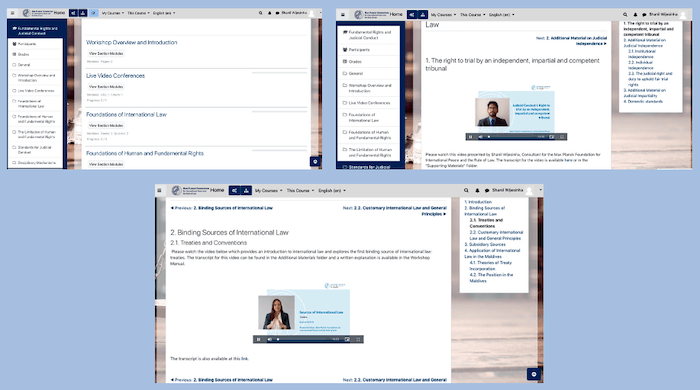Organised with the Department of Judicial Administration and the Judicial Academy
The workshop entitled “Fundamental Rights and Judicial Conduct in Theory and Practice” was held online between 6-13 December 2020. Over 80 participants took part including 31 Judges from the High Court, Civil Court, Family Court, Juvenile Court and Magistrate’s Court of the Maldives as well as 54 legal officers, registrars, assistant registrars and legal assistants from various courts in the Maldives. It was hosted on the Foundation’s LEARN platform. The content on this platform was supplemented by a Manual drafted by the Foundation and made available in both English and Dhivehi for participants to download.
The programme was divided into two parts, one addressing fundamental rights and the other, judicial conduct. The content on fundamental rights was divided into three main sections: foundations of international law, foundations of human and fundamental rights and the limitation of human and fundamental rights. Judges were presented with substantive content as well as exercises to practically apply this knowledge.
The judicial conduct content was divided into two main elements: standards of judicial conduct and disciplinary mechanisms. The section covered standards of proper judicial conduct contained in human rights law and judicial ethical codes of conduct, exploring both the domestic and international ethical standards applicable to judges. Participants were also given practical exercises to observe real-life judicial examples of judicial conduct as well as to apply ethical standards to scenarios they may encounter in their judicial duties. The content was greatly enhanced by the expertise shared by Justice Aisha Shujune Muhammad, a Judge of the Supreme Court of Maldives as well as a member of the Judicial Service Commission (JSC), during a podcast recorded on the topic of disciplinary mechanisms for breaches of judicial ethics.
Additionally, three live video conferences were held on 6, 10 and 13 December 2020. During which, participants were asked to discuss the sources of international law, consider practical problems in judicial reasoning for the limitation of fundamental rights, and evaluate their personal responses to ethical problems. The final video conference included the participation of Justice (Dr) Mathilda Twomey, former Chief Justice of the Supreme Court of the Seychelles and current Judge of the Court of Appeal of the Seychelles. Drawing from her vast experience, Justice Twomey engaged with the participants by sharing the challenges to independence faced by judges and court officers and offered tools for resilience to resist such challenges. She contextualised the discussion within small island nations and emphasised the importance of members of the judiciary standing in solidarity with one another.
After the live video conference on tools for resilience, the event concluded on 13 December with closing remarks from one of the Foundation’s Managing Directors, Johannes Krusemark. The content on the LEARN platform will remain available to registered participants until mid-January. This workshop formed part of the German Federal Foreign Office funded project, “Strengthening the Rule of Law in the Maldives”.

